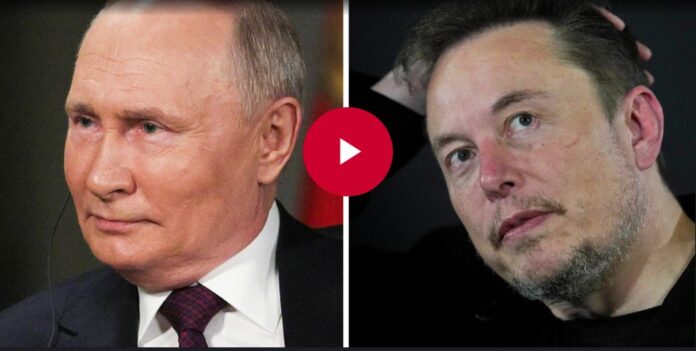After Russian dictator Vladimir Putin, Elon Musk may be the wealthiest man in the world, but like Putin, he is very arrogant and not always the smartest.
Maybe it’s because he has to adhere to his odd libertarian philosophy, which, in this case, boils down to rich people being generally more intelligent than the masses. Still, in one instance, he is wrong.
(See video of Putin praising Musk.)
This instance is ESG investing. ESG, which stands for Environmental, Social, and Governance investing, is a style of selecting stocks based on the criteria in its title. It differs from other equity investing styles, such as investing in small, medium, or large-cap stocks, only because of its stock selection criteria. Equity analysts and fund managers have developed, perfected, and monitored these traditional equity styles for about a hundred years.
ESG investing is newer (it began in the late 1970s), but it is a wildly popular $40 trillion global investment style magnet, with a $400 billion market in the United States alone.
But Musk and the other libertarians and neo-liberals hate ESG investing for political reasons: More than other traditional equity election styles, ESG investing challenges corporate control over a corporation’s internal business operations, such as the number of minorities and women in senior positions, anti-pollution practices, corporate governance and transparency, and other daily business activities which may be anti-investor or anti-community.
That’s the real reason Musk and other anti-ESG advocates hate this investing category. It’s all about control.
ESG is Not a New Idea
In a recent interview on Yahoo Finance, Musk was interviewed by the more right-wing and motor-mouth former Republican presidential candidate, Vivek Ramaswamy.
In the interview, Musk offers his incorrect opinion: “We don’t do some sort of like bizarre like communism rebranded thing, which is like a lot of what ESG is and to be inflicted upon corporate America without the knowledge of the actual shareholders, which is what’s going on,” he said during a 2023 discussion with Ramaswamy.
Why Musk stoops to say that ESG is a Communist plot is laughable, but since no one ever challenges Musk, it seems he can get away with making nonsensical statements.
To drive his Communist argument further, Musk attacks some of the biggest names in American capitalism to say that these firms are “lying” to shareholders about the level of their ESG investment selection process in daily portfolio management and stock selection.
Musk says in this same interview, “The public is being lied to … And I’m naming names here: BlackRock, Fidelity … I know you guys, and you need to tell your customers that you’re not making the optimal decisions for shareholder value because that’s what’s going on,” he said.
This doesn’t seem right for several reasons, and these are reasons Musk knows are valid.
- ESG investing funds have about the same returns, or better, as other funds using non-ESG investing strategies. In the longer term, Reuters reported that the Dow Jones Sustainability World Index had a total return of 21.7% from the start of the year to the last week in December 2023. “It is a sustainability-focused subset of the S&P Global Broad Market Index, with a total return of 17%.
“In 2022, that sustainability index also did better than the broader market, even as investors lost money. It had a total return of negative 15.6% while the broad index had a total return of negative 20%.”
In the short term, a report by the Morgan Stanley Institute for Sustainable Investing found that in the first half of 2023, sustainable funds saw a median return of 6.9%, beating traditional funds’ 3.8% and reversing their underperformance in 2022.
2 “The public is not” being lied to, according to Musk. This is a ridiculous statement. ESG funds are clearly labeled as following general or other more specific ESG criteria, such as those that are strictly pro-environment, have female CEOs, or have exceptional transparency with their shareholders and the public. These criteria are all spelled out in the fund’s prospectus, SAI, and other public information disclosed on their websites.
3 ESG is not new.
As a reporter with the trade magazine Pensions and Investments in the mid-1970s, I wrote what could be the first story on ESG investing, which at the time was known as Social Investing, which meant that publicly-listed companies had to follow ethical, environmental, pro-consumer, and anti-discrimination guidelines and then put them into actual practice. The foundation that adopted Social Investing policies was the Jane Addams Hull House. This was a pioneering community settlement house and social welfare agency on Chicago’s near West Side. The Hull House provided immigrant education and financial aid to European immigrants and Afro-Americans. Two giants in social agency movement founded the Jane Adams Hull House: Jane Addams and Ellen Gates Starr.

In the mid-1970s, social investing initially focused on pushing companies doing business in South Africa to resist that nation’s apartheid policies. This meant companies followed the lead of the Jane Addams Hull House pension board and the Sullivan Principles, the anti-discrimination rules named after the Rev. Leon Sullivan, a civil rights leader and a member of the General Motors Pension Fund board of trustees.
That corporate and investment pressure produced results, and the early days of social investing chalked up a significant victory in reforming the apartheid practices in South Africa.
Conservatives Target ESG
The unprecedented global corporate activism sparked by the Russian invasion of Ukraine in February 2022 marked a turning point in ESG investing.
ESG investing has about $40 trillion in assets under management worldwide, but to social and economic conservatives, ESG investing poses a significant threat to the unchallenged authority of corporations.
This is why the rapid decision by significant corporations worldwide to suspend business operations with Russia marked the largest concerted corporate protest focused around a single cause ever organized. It was also a massive milestone for ESG investing.
To date, some 600 corporations have suspended operations with Russia. But, while public opinion has overwhelmingly supported this new level of corporate activism, cultural and economic conservatives have condemned the Russian sanctions as a violation of corporate responsibilities that endangers corporate goals and violates the workings of free-market capitalism.
Today, conservatives oppose ESG investing for four reasons:
- ESG policies detract corporations from their primary goal of making the most significant profits possible;
- ESG gives shareholders too much influence over guiding corporate policies outside of direct business operations;
- ESG is a threat to traditional corporate and political power.
- ESG is incompatible with free-market capitalism and conventional economic theory.
This is nothing new. As early as the 1970s, right-wingers have rung the bell that capitalism is under attack. In the famous 1971 memo to the conservative U.S. Chamber of

Commerce by Lewis Powell (later a Supreme Court judge), the Californian said the free enterprise system was under attack from liberal arts departments at college campuses, the New Left, television, Ralph Nader, the clergy, books, and intellectual journals. Looking back, Powell provided the fuel to start the culture wars that have become the daily fodder for the right wing.
Conservatives Fear ESG as a Paradigm Shift
Right-wing think tanks now equate ESG with a significant shift in corporate management and ownership. In an article in the right-wing publication Imprimis, from Hillsdale College (December 2021), Michael Rectenwald traces ESG to “stakeholder capitalism” that emerged in the early 1970s (at about the same time as the rise of social investing) and then to the “Great Reset,” a term that appeared in 2001 after the 2008 mortgage crisis.
In his version of the story, the “Great Reset” is a process where stakeholder capitalism (aka ESG) confronts the free market system and corporate control to advance “increased government intervention in the economy.” This theory also involves COVID and climate change, but Rectenwald also said it will lead to “corporate socialism” and what an Italian philosopher, Giorgio Agamben, calls “communist capitalism.”
ESG advocates have probably never heard of this, but it is a powerful theme in right-wing renditions of ESG. Rectenwald states, “Stakeholder capitalism involves behavioral modification of corporations to benefit not shareholders, but stakeholders.”
If this sounds familiar, it should; it echoes Milton Friedman and now neo-liberal Elon Musk, another “free market” capitalism champion, who opposes corporations that violate ESG principles and have political power.
But there is more. The Great Reset means more state control, more immigration, more printing of money, higher taxes, job losses due to vaccine mandates, and more state control due to the Fourth Industrial Revolution.
All this means that ESG investing is a significant problem because it gives shareholders more rights to challenge egomaniac libertarians like Musk.











